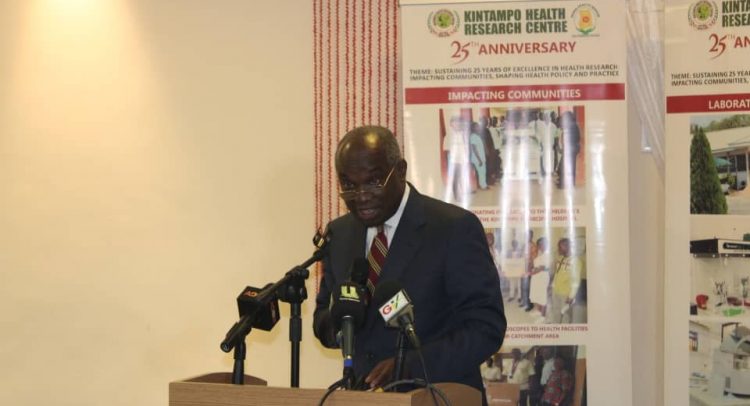Dr Asamoah-Baah
THE KINTAMPO Health Research Centre (KHRC) has launched activities for the celebration of its 25th anniversary.
The activities including health outreaches are targeted at highlighting the significant contributions of the centre to major research issues which have impacted the lives of Ghanaians over the years.
Dr. Kwaku Poku Asante, Director of the Kintampo Health Research Centre, speaking at the anniversary launch recently in Accra, said the Centre had taken part in critical scientific research activities like the vitamin ‘A’ project and supported the National Malaria Control Programme to advocate for testing for malaria before treatment.
“We were highly involved in the testing for the safety and efficacy of the first malaria vaccine among other research breakthroughs for emerging Non-Communicable Diseases,” he said
However, Dr. Asante observed that the Centre was faced with funding challenges for research.
Currently, he said, 70 per cent of the center’s finances were from donor sources which do not provide a sustained source of funding.

He therefore urged government and corporate organisations to urgently address the issue by mobilizing domestic resources for scientific research in Ghana.
Lecture Series
The occasion also saw the launch of a Bi-annual lecture series in honour of Dr Paul Arthur, the Centre’s first Director.
Opening the lecture series, Dr Anarfi Asamoah-Baah, Former Deputy Director-General, World Health Organization (WHO), congratulated KHRC for its achievements and sustained contributions to public health research in Ghana over the years.
He cited the KHRC’s key roles in numerous health researches that had informed policy decisions, especially the recent development of the new malaria vaccine which was currently being introduced into routine immunization in Ghana, Kenya, and Malawi.
Speaking on the theme: “Sustaining 25 years of Excellence in Health Research: Impacting Communities, Shaping Health Policy and Practice,” Dr Asamoah-Baah said the road into the future for research was going to be challenging.
He said with research becoming multidisciplinary with high public expectations calling for quick outcomes, and coupled with the lack of trust in public institutions, “people would no longer accept to be used as guinea pigs.”
Dr. Asamoah-Baah stated that sustaining the gains would require strengthening the availability of funding for research, improving existing research infrastructure and increasing the number of centres to improve empirical data.
He again advocated for improved collaboration with academia, and enhanced capacity building of research staff on a sustained basis.
Dr Anthony Nsiah-Asare, the Director-General of the Ghana Health Service (GHS), admitted that there was the need to do things differently if Ghana was to achieve the Sustainable Development Goals (SDGs).
He challenged the KHRC to research further into health issues such as the reasons for the low tuberculosis detection rates, and the struggles with achieving the Prevention of Mother-to-Child-Transmission of HIV (PMTCT), as well as why anemia was still high among pregnant women.
He affirmed the commitment of his outfit towards the activities of the Centre and noted that the GHS will support it with the needed human resource capacity for effective delivery of its mandate and services.
Alexander Abban, the Deputy Minister of Health, stressed that Ghana’s scientists were commended internationally and “we must be grateful to them.”
He urged the KHRC to sell itself for the whole world to acknowledge their contributions to public health.
He, however, lamented about the slow translation of research outcomes into actions.
The Deputy Minister said the Ministry was working to address the disconnection to help improve the lives of Ghanaians.
By Jamila Akweley Okertchiri

